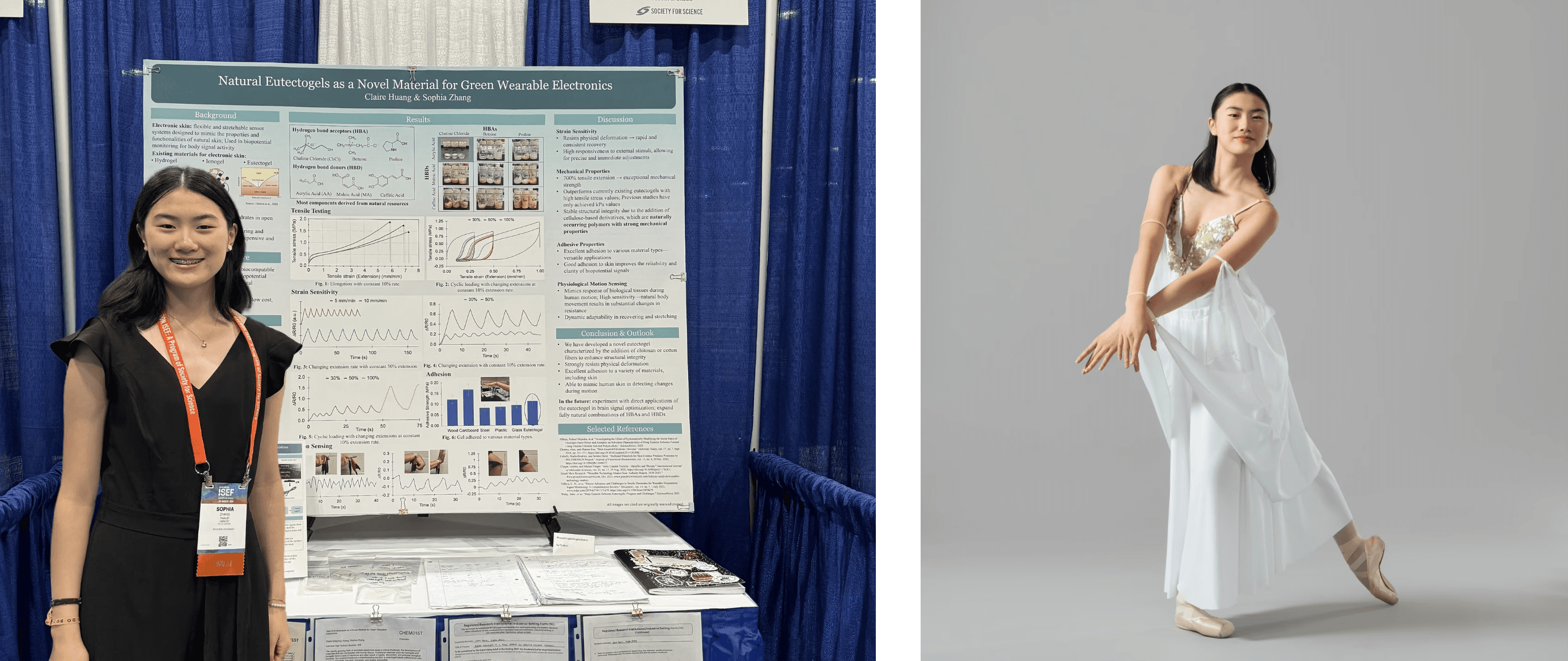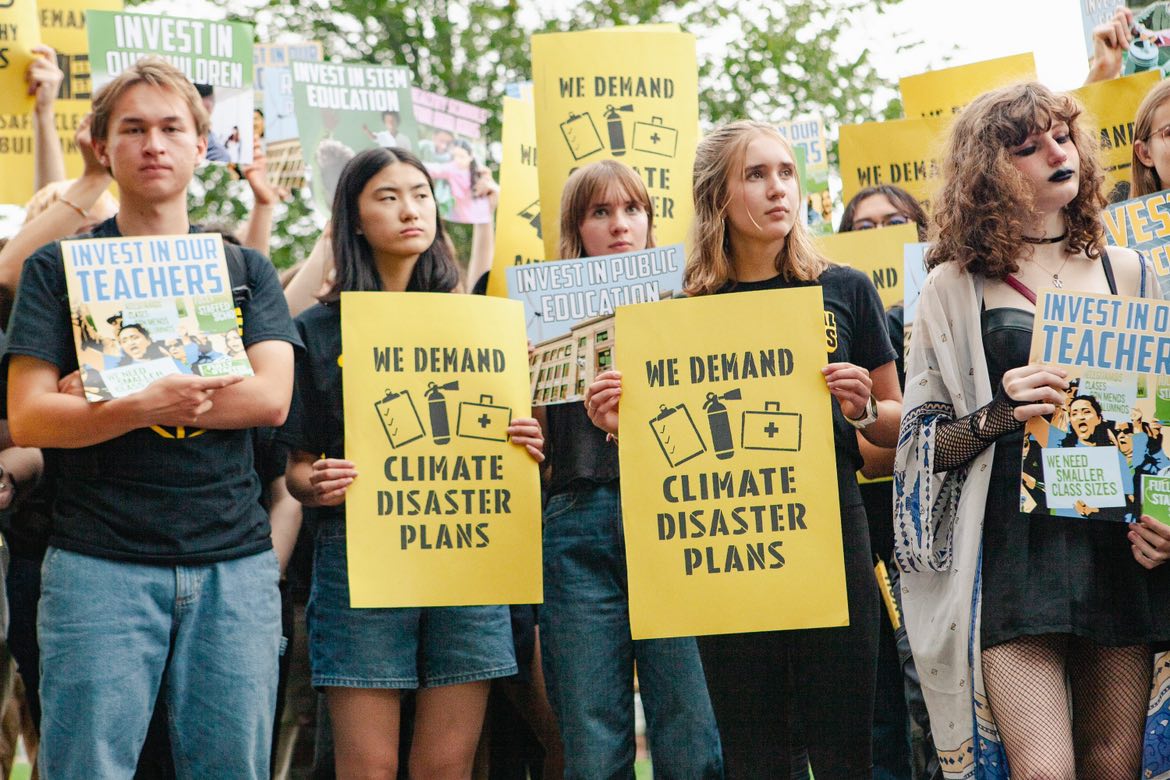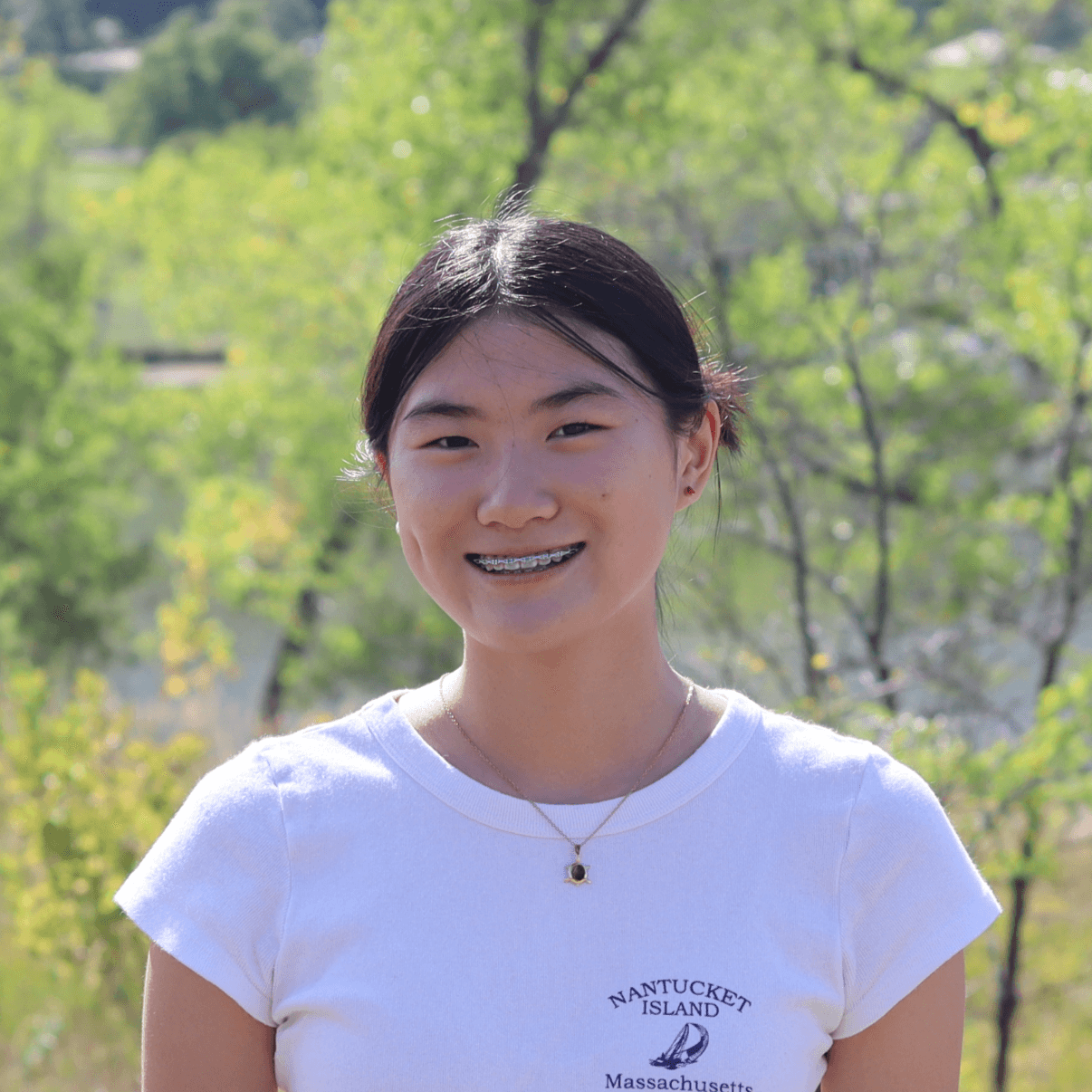Sophia Zhang
The fellowship completely changed my perspective on the strength of community in moments where young people who are so incredibly passionate about the same things come together to grow. Even though this fellowship was entirely online, I found a special sense of connection to each guest speaker, each post on Ed Discussion threads, and each cute avatar I saw in trivia nights or game & networking sessions. I think the most unique thing about the fellowship was that it ripped the bandaid off and taught me about the reality of how hard you have to work in competitive industries, but even more powerfully, inspired me to keep working hard until my dreams become reality. Even more inspiring was the fact that I could tell that everyone I met during the fellowship was absolutely meant to be there; I clicked with them instantly, sharing their career aspirations and strong work ethic. Fun fact: I'm still in touch with my first Coffee Chat partner on Instagram! Overall, the lessons that the fellowship taught me will probably stick with me forever as I build my career.
Sophia Zhang is a high school student from Colorado with a passion for biology, chemistry, and climate activism. Outside of school, she dedicates much of her time to research, exploring innovative projects in biochemistry. Last year, Sophia developed electronic skin as neural electrodes to improve brain signal accuracy, earning a special award at the International Science & Engineering Fair (ISEF)! This year, she’s continuing her work by researching hydrogels for tissue growth and wound healing.
Beyond her research, Sophia is a dedicated climate advocate, committed to advancing environmental legislation. Over the summer, she was inspired by another fellow who focuses on raising environmental awareness in their local community in Mexico. This led Sophia to join Our Youth for the Climate as an outreach coordinator, where she now works to make a direct impact in her own Colorado community. Read on to learn more about Sophia, her research projects, and her commitment to environmental advocacy!
Meet Sophia!
How did you initially become interested in STEM?
Both my parents are scientists, so I grew up hearing them talk about their research. They’d often use these big scientific terms, which I didn’t understand at the time, and that lack of understanding actually sparked my curiosity. I think I naturally gravitated toward STEM because I wanted to make sense of what my parents were talking about.
In 4th grade, I did my first science project. I demonstrated to my classmates why an Ivory Soap bar floats while other soaps sink—it’s because Ivory Soap has more air in it, making it less dense. It was a small, simple project, but looking back, it was a cute start to my journey in science!
What fields of STEM are you interested in?
I’m definitely most passionate about biochemistry. Chemistry is my strongest subject, but I’m fascinated by the intersection of biology and chemistry, especially as it applies to humans. I love learning about fundamental processes that impact our emotions and well-being, like dopamine and other neurotransmitters.
What I find amazing about biology is that it lets us understand life on such a fundamental level. Cellular and molecular biology, in particular, are so small-scale, yet they have such a huge influence on our bodies. That connection—where something so microscopic can affect us so profoundly—is incredible to me. Being able to work directly with the building blocks of life is just so cool.
What extracurricular activities are you involved in?
I’m very involved in research outside of school. Last year, I worked on a project exploring the use of electronic skin as neural electrodes to transmit more accurate brain signals, aiming to improve the accuracy of decoding and analysis. I entered my research into science fairs and was thrilled to receive a special award at ISEF! This year, I’m continuing my research, focusing on hydrogels for tissue growth and wound healing. Research is incredibly rewarding to me, because it feels like I’m contributing to important advancements in science.
Outside of research, I’m very passionate about climate activism. I’m leading a state climate justice campaign with other youth leaders, working to pass climate legislation in Colorado. We’re lobbying legislators with demands for safe and clean buildings powered by renewable energy, pathways to green jobs, climate curriculum standards, free healthy lunches, and disaster plans for climate events. This is really personal for us—our community faced a devastating fire a few years ago, and we want to make sure there’s a plan in place to keep students safe if something like that happens again. We’re building a Colorado climate coalition to mobilize young people and create real change.
And like I mentioned earlier, chemistry has always been a huge passion of mine. The summer after my freshman year, I took two college-level chemistry courses at the University of Colorado, which further sparked my interest. Then, I got involved with the chemistry olympiad. It was a ton of work and took a lot of studying, but I was recognized as a semi-finalist in the U.S. National Chemistry Olympiad (USNCO), and it was cool to see all my hard work pay off!
What do you enjoy doing outside of school?
I really love dance, especially ballet. This year I’m performing in The Nutcracker, which I’m super excited about! I love ballet because it brings out my artistic side, which is a nice balance to all my science activities. Also, I’m also really into music. It’s amazing how music can lift your mood in just a few minutes. If I’m feeling down, I put on a good song, and it helps me feel more relaxed. I love the 2010 Pop Era—artists like Adele and Rihanna bring a nostalgic happiness.

Summer Experience
What was your favorite part about the fellowship?
I really loved how practical the fellowship was, and how I could directly see how to apply all the lessons we learned to my life. The ideas we learned about were big-picture and inspiring, but what made it stand out was how they broke everything down into specific, actionable tactics. For example, Jiwoo’s three-point strategy and her advice on following your North Star, or Alexa’s time management tips—they were all things I could immediately apply to my own life. I still use a lot of those strategies today, like stretching instead of going on my phone during breaks. It’s simple but incredibly effective.
I also loved how the fellowship connected ideas to real-life applications. Through the deliverables, we took what we learned in the Fireside Chats and applied it to actual plans and goals. That made it so much clearer how to implement these strategies in everyday life. Often, when other speakers talk about achieving goals, it’s like, “Oh, you should do this,” but they don’t explain how. The fellowship taught us the “how” to actually achieve our goals.
What was your favorite talk or speaker from the summer?
I’m torn between Jiwoo’s Fireside Chat and Alexa’s because they were both so practical and actionable, which is exactly how I learn best—I need clear steps to apply it to my life. Jiwoo’s three-point strategy was so organized, and it really resonated with me. She talked about finding your niche, identifying mentors, and creating evidence to pursue your dreams. That structure just made sense, and I loved her advice on mentors. She said, “A mentor sees something in you that you haven’t seen in yourself yet,” which was so powerful. Her Fireside Chat inspired to continue exploring my passions in biomedical engineering and continue on with my research journey.
I also really loved one of Isabella’s Shorts! She’s a recent high school graduate, so she’s a lot closer to my age, which made her really relatable. She had these unique ideas, like “be your most recent text message,” which I’ve started doing. It’s surprisingly powerful to leave yourself reminders, goals, or inspirational messages. She has this fresh perspective, and her smaller but impactful ideas have really stuck with me.
What are some of the most valuable lessons you learned over the summer?
I kept a notebook of all the lessons I learned over the summer, and there are so many! One that really stuck with me was from Jenny’s talk. She talked about facing rejection while building her tech company, with people telling her it wouldn’t work or wasn’t good enough. Her advice was to be the underdog and prove them wrong. I found that message so powerful—rather than letting doubt stop you, you use it as fuel to show what you’re truly capable of. For me, when people underestimate me, it gives me so much motivation to prove them wrong.
Another really helpful skill came from Alexa’s talk on time management. She had a system for prioritizing tasks using a grid—sorting them by urgency and importance—which has really helped me organize my work. It makes my tasks feel more manageable because I know what to focus on first, and I’m not trying to multitask everything at once. Alexa also had us map out how we spend our time, and seeing my own pie chart was a wake-up call. I realized I was spending way too much time on my phone. Now, whenever I catch myself doom-scrolling, I think back to that pie chart as a reminder not to let myself down. It’s really helped me be more intentional with my time.
What advice would you give to future fellows?
My main advice would be to really make the most of your time and connect with all the other fellows! Looking back, I wish I had been more proactive in reaching out and meeting other fellows. The entire community was very kind and supportive, and it was really inspiring seeing what other students were working on. For example, I remember seeing another student post about implementing climate curriculum and raising awareness in their local community in Mexico. It inspired me to take action on a smaller scale, beyond climate legislation, and I began working with a climate organization in my own community.
Future Aspirations
What are your future aspirations?
My dream is to become a translational researcher. That means developing cures, therapies, or treatments in the lab—my focus would be on a molecular scale—and then translating those discoveries into actual products that can be used by patients. While it would be challenging to get these products approved and into use, I think the process of bringing something from the lab directly to patients is incredibly meaningful.
Connecting with patients is really important to me. I don’t want to just do research without understanding the human stories behind the diseases I’m trying to address. Over the summer, Jiwoo spoke about this as well—how connecting with patients is one of the most inspiring parts of her work. I know it can be emotionally challenging, but for me, that connection is essential. It’s why I want to pursue translational research, allowing me to combine scientific work with a deeper, personal impact.
How did the fellowship influence your future career aspirations?
Before the summer, I wasn’t completely sure what I wanted to be yet. I was thinking of becoming a surgeon, but through the fellowship, I realized how passionate I am about research. I also learned you can combine and adapt skills from multiple disciplines— I realized that instead of just being a surgeon, I would love to be a translational researcher, so I can both conduct research while also interacting with patients. Now, I’m heavily considering pursuing an MD-PhD. It was inspiring to hear from the medical student panel this summer and the mentors who were pursuing MD-PhDs. I know pursuing an MD-PhD can be extremely challenging, but I realized it may be super worthwhile.
What have you been up to since the fellowship? Have you been working on anything new you’re excited about?
As I previously mentioned, I was really inspired by another fellow this summer who focused on raising environmental awareness in their local community in Mexico. I thought it was really cool that they were focusing on creating impact in their own community, and this inspired me to think about contributing more on a smaller, local scale. In the past, I’ve been involved in climate lobbying which is connected to a national movement, but I wanted to find a way to make a personal impact.
I recently joined a climate organization called Our Youth for the Climate as an outreach coordinator. My role involves researching organizations, sustainable clubs, and high schools that might be interested in integrating climate curriculum. It’s can definitely be challenging at times, but that’s also what makes it so rewarding—when someone responds with interest and says they’d like to integrate climate awareness into their classroom, it feels like a direct impact that I helped create. It feels like a really warm and meaningful connection, and I’m excited to continue working with them!

The Summit STEM Fellowship (SSF) is a virtual summer fellowship empowering the next generation of leaders in STEM. With alumni from over 30 countries, the fellowship has formed a vibrant, diverse network of future STEM leaders. To learn more, please visit the Fellowship Overview page. You can also find student spotlights on the Summit STEM Fellowship Newsletter. Subscribe to stay up to date with program announcements and new student spotlights!
Applications for the 2025 Summer Fellowship are now open. To apply, students must fill out a 2025 Summit STEM Fellowship Application. Admissions are rolling, and students are encouraged to apply as early as possible.

